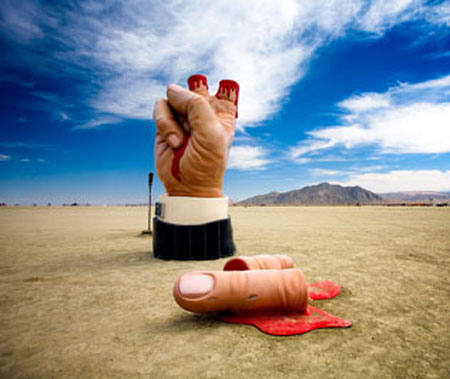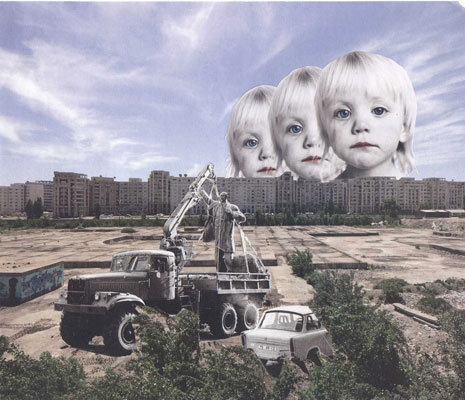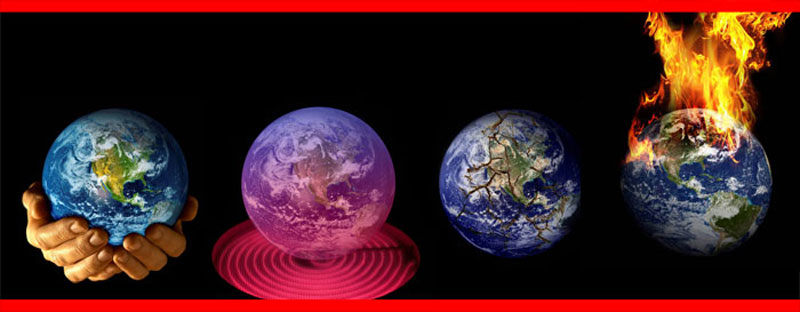The modern economic system, being driven by materialistic incentives and measured by production and consumption, is deliberately designed by vested interests to create insatiable desires. Obviously, the more people buy, the more money is made by the sellers. When these sellers are primarily motivated by short-term profit, which is the case today, the overall effect on society is negative. This is well known in academic circles. Lester Brown of the Earth Policy Institute wrote: “Our global civilization today is on an economic path that is environmentally unsustainable, a path that is leading us toward economic decline and collapse.” Robert Lane noted in his book Loss of Happiness in Market Democracies that many people in advanced market democracies throughout the world are haunted by the specter of unhappiness and depression. Does affluence + choice = well-being? Daniel Kahneman, Nobel Laureate in Economics, noted that affluence is on the rise but happiness is declining, an effect he calls the “Affluence-Happiness Paradox.” We are paying a high price for materialism: higher anxiety, depression, drug & alcohol use (not to mention abuse); lower self-actualization, vitality, and satisfaction.

Daniel Kahneman and Amos Tversky of Princeton University have pointed out another interesting paradox: increased choice among material objects leads to decreased happiness. This is because choosing one option means foregoing others: the wider the range of choice, the deeper the sense of loss. Losses make us hurt more than gains make us feel good. We should also keep in mind the phenomenon of adaptation: the joy of possessing an item declines with time. People consistently misestimate how long good experiences will make them feel good and how long bad experiences will make them feel bad, according to studies by Daniel T. Gilbert of Harvard University and Timothy D. Wilson of the University of Virginia. The greater the expectation, the greater the frustration is about a poor choice. Barry Schwartz wrote in his revolutionary book The Tyranny of Choice: “With group after group of people, varying in age (including young adolescents), gender, educational level, geographic location, race and socioeconomic status, we have found a strong correlation between maximizing and measures of depression.” Ed Diener and Martin Seligman noted in their book Beyond Money: “In stark contrast to the improvement in economic statistics over the past 50 years, there is strong evidence that the incidence of depression has increased enormously over the same time period. This is a very revealing paradox.” Barry Schwartz said that a point is reached at which an increased range of choice brings increased misery rather than increased opportunity. It seems that American society has already passed that point. According to a study at Columbia University: “Evidence is mounting that subjective and, in several cases, even objective well-being may be negatively affected by choice proliferation; policy makers should consider when and how much choice to give in various public realms.”
Are We Raping Our Planet?
According to the Worldwatch Institute, 33% of the planet’s natural resources have been consumed in the last 30 years, 25% of the fifty recent wars and armed conflicts have involved a struggle for control of natural resources, 4% of the US’ original forests are left, 80% of the planet’s original forests are gone, 40% of US rivers are undrinkable, 30% of the kids in parts of the Congo now have had to drop out of school to mine coltan (used in electronics), globally 200,000 people a day move into cities to live in slums and work in toxic industries that release 4 billion lbs of toxins a year (breast milk contains the highest levels of many toxins), 40% of ocean areas are strongly polluted and only 4% remain pristine. Dr. Halpern wrote in the prestigious Science Magazine (February 15, 2008) “I study this stuff all the time and didn’t expect the impacts to be as pervasive as we found.” Hawken and coworkers revealed in Natural Capitalism: “There is no longer any serious scientific dispute that the decline in every living system in the world has reached an extraordinary threshold.” According to the International Confederation of Free Trade Unions (ICFTU), there are 1.2 million fatalities on the job each year (3,300 deaths per day), and 160 million new cases of work-related diseases. The Worldwatch Institute also reported that in 1960 the Gross Domestic Product (the total market value of all final goods and services produced in a country in a given year) of the 20 richest countries was 18 times greater than that of the 20 poorest countries. By 1995, the gap between the richest and poorest nations had more than doubled to 37 times.

The World Wildlife Fund, a global conservation organization, revealed in their Living Planet Report for the year 2006 that, according to current projections, humanity will be using two planets’ worth of natural resources by 2050 — if those resources have not run out by then. It also confirms the trend of biodiversity loss seen in previous Living Planet Reports. Already resources are depleting, with the report showing that vertebrate species populations have declined by about one-third in the 33 years from 1970 to 2003. At the same time, humanity’s ecological footprint —the demand people place upon the natural world—has increased to the point where the earth is unable to keep up in the struggle to regenerate. “We are in serious ecological overshoot, consuming resources faster than the earth can replace them,” said WWF’s international director James Leape. He added: “The consequences of this are predictable and dire. It is time to make some vital choices. Change that improves living standards while reducing our impact on the natural world will not be easy. The cities, power plants and homes we build today will either lock society into damaging over-consumption beyond our lifetimes, or begin to propel this and future generations towards sustainable living.” The Living Planet Report uses various data to compile two indicators of the earth’s well-being. The first, the Living Planet Index, measures biodiversity, based on trends in more than 3,600 populations of 1,300 vertebrate species around the world. In all, data for 695 terrestrial, 344 freshwater and 274 marine species were analyzed. Terrestrial species declined by 31 per cent, freshwater species by 28%, and marine species by 27%. The second index, the Ecological Footprint, measures humanity’s demand on the biosphere. Humanity’s footprint has more than tripled between 1961 and 2003. This report shows that our footprint exceeded biocapacity by 25% in 2003. The carbon dioxide footprint, from the use of fossil fuels, was the fastest growing component of our global footprint, increasing more than ninefold from 1961 to 2003. Countries of over a million people with the largest footprint, in global hectares per person, are the United Arab Emirates, the United States of America, Finland, Canada, Kuwait, Australia, Estonia, Sweden, New Zealand and Norway. China comes mid-way in world rankings, at number 69, but its growing economy and rapid development mean it has a key role in keeping the world on the path to sustainability. New, more comprehensive methodology identifies overfishing, industrial agriculture, urban sprawl and carbon emissions as the chief culprits driving ecological overshoot.
WWF’s conclusions are confirmed by another group called Redefining Progress, who found that humanity’s ecological footprint exceeds the earth’s biological capacity by nearly 40%, as revealed in their Footprint of Nations report. The ecological footprint—a concept refined over the past decade by Redefining Progress—is a measure of the amount of nature it takes to sustain a given population over the course of a year. By comparing a population’s footprint with its biological capacity, ecological footprint analysis suggests whether or not that population is living within its ecological means. If a population’s footprint exceeds its biological capacity, that population is said to be engaging in unsustainable ecological overshoot. According to the new Footprint of Nations report, humanity’s footprint is 57 acres per person while the earth’s biological capacity is just 41. “The ecological footprint is becoming an increasingly accurate tool for monitoring humanity’s impact on our planet’s vital life support systems. Our new results should heighten concern about ecological overshoot, and our new tools give the whole world the ability to understand and then to act,” said Michel Gelobter, Executive Director of Redefining Progress. RP’s new ecological footprint analysis underscores the need to act soon to curb a runaway greenhouse effect, an extinction rate approaching nearly 1,000 times the natural rate, and degradation of farmland, forests, fisheries, and pastures. The good news is that the largest single threat, climate change, is now being addressed by the Kyoto Protocol. The ecological footprint highlights the need to make even deeper cuts in our consumption of fossil-fuel-based energy and increase the speed of the transition to widespread renewable energy. The latest Footprint of Nations report is available online at www.ecologicalfootprint.org.
Victor Lebow said: “Our enormously productive economy… demands that we make consumption our way of life, that we convert the buying and use of goods into rituals, that we seek our spiritual satisfaction, our ego satisfaction, in consumption . . . [W]e need things consumed, burned up, replaced, and discarded at an ever-accelerating rate.” Gary Cross wrote in An All-Consuming Century: “The real winner of the century was consumerism. Visions of a political community of stable, shared values and active citizenship have given way to a dynamic but seemingly passive society of consumption in America, and increasingly across the globe.” The U.S. has 5% of the world’s population but consumes 30% of the world’s resources and creates 30% of the world’s waste. The average U.S. person now consumes twice as much as 50 years ago. If everybody consumed at U.S. rates, we would need 3 to 5 planets!
In summary, materialistic economics is based on exploitation, encourages unlimited consumption, is unsustainable, is divisive, focuses on individual material welfare, forces people to give up higher needs, thrives on lower materialistic tastes, leads to animalistic dealings and relationships, is harmful to oneself and other people, and produces irreversible damage to nature and biodiversity.

What Peace?
Green Economy to the Rescue?
What’s the alternative? Some propose “the green economy,” whose virtues are said to include sustainability, equity, renewable energy, local economies, fair trade, recycling, and closed-loop production. Although a step forward from sheer materialism, the green economy fails to confront the root cause of the problem, which is consumption mania. Thomas Princen, Michael Maniates, and Ken Conca wrote in their book Confronting Consumption: “Much that is said today in the name of sustainability continues to stress the familiar environmental themes of population (too large), technology (not green enough), and economic growth (not enough of it in the right places). Consumption occasionally enters the discussion, but only in non-threatening ways, and most often in the form of calls for ‘green consumption’ or in support of some moral imperative to consume recycled or recyclable products. Much of this sustainable development talk steers clear of escalating consumption and, especially, the roots of such escalation.” Indeed, the green economy itself is a rapidly growing billion-dollar sector!
Moreover, the green economy’s proposed solutions are often accompanied by severe side effects. Consider biofuels, specifically ethanol. C. Ford Runge and Benjamin Senauer wrote in their article “How Biofuels Could Starve the Poor” in the journal Foreign Affairs (May/June 2007): “Biofuels have tied oil and food prices together in ways that could profoundly upset the relationships between food producers, consumers, and nations in the years ahead, with potentially devastating implications for both global poverty and food security.” Timothy Searchinger, a researcher in environment and economics at Princeton University, wrote in his article “Biofuels Deemed a Greenhouse Threat,” which was published in the NY Times: “Most of the biofuel that people are using or planning to use would probably increase greenhouse gases substantially.” Regarding solar power, Terrence J. Collins, an environmental expert and professor at Carnegie Mellon University, wrote in his article “Turning Glare into Watts,” which was published in the New York Times: “The one thing that’s eventually going to raise its head is desert biodiversity, and the land area itself.”
Aside from these problems, we must keep in mind the enormity of the crisis we face, as documented in detail earlier in this article. When we consider this enormity, it is apparent that Green Economy is ineffective and superficial. A final problem with the green economy is that it doesn’t address the lack of spiritual well-being. Clearly we need a fundamental change in consciousness!

←This image’s sarcastic title is “Consumerism Will Free This World.” The culture of consumerism is busy freeing us from nature by destroying it. The World Wildlife Fund, a global conservation organization, revealed in its “Living Planet Report” for the year 2006 that, according to current projections, humanity will be using two planets’ worth of natural resources by 2050 — if those resources have not run out by then. The question is, what is capable of checking the runaway material desires and attachments of the current world’s population? For the answer, read the last section of this article, entitled “SPIRITUAL ECONOMICS.”
Spiritual Economics
Consumption mania is eliminated when we realize that we are transcendental beings who are inherently different from our physical bodies. According to the Bhagavad-gita (2.59), through genuine meditation one experiences a pleasure superior to the greatest material pleasure, which means that one naturally loses interest in unnecessary material things. The Bhagavad-gita (2.62–63) further says: “While contemplating the objects of the senses, a person develops attachment for them, and from such attachment lust develops, and from lust anger arises. From anger, complete delusion arises, and from delusion bewilderment of memory. When memory is bewildered, intelligence is lost, and when intelligence is lost one falls down again into the material pool.” This cycle is avoided by genuine meditation.
Srila Prabhupada, founder of the International Society for Krishna Consciousness, said, “By diverting attention to so many unwanted things, human energy is spoiled without achievement of spiritual realization, the prime necessity of human life. Advancement of material vision or material civilization is a great stumbling block for spiritual advancement. Such material advancement entangles the living being in the bondage of a material body, which is followed by all sorts of material miseries.”
Spiritual economics promotes the following desirable things: individual and collective material well-being, individual and collective spiritual well-being, positive psychology, occupations that satisfy psycho-physical needs, tools and methodologies to help people experience a higher pleasure, ideal self-sufficient communities, sustainable development, natural economics, simple life, social service, higher consciousness and activities, respect for nature, a focus on care and preservation, and nonviolence toward other humans, as well as animals and plants. Moreover, spiritual economics eliminates the following undesirable things: conflicts, personal and social imbalances, exploitation of the weak, materialism, social chaos, inequality, greed, scarcity, prejudice, discrimination, and unhealthy consumption. Keep in mind that real pleasure is in GIVING, not TAKING! But note that one who thinks himself a material product cannot stop thinking, fearing, and worrying about his material security, and thus the greed forces in the culture of TAKING and pushes out the culture of GIVING.

Ruins of a stunningle beautiful temple in the jungles of Cambodia now stand as a monument to a culture that strived for spiritual achievements.






junk yards austin tx
Can find the RSS button. I want to follow you! Please HELP!
Mahat
feed://16rounds.epikyoor.com/feed/rss/